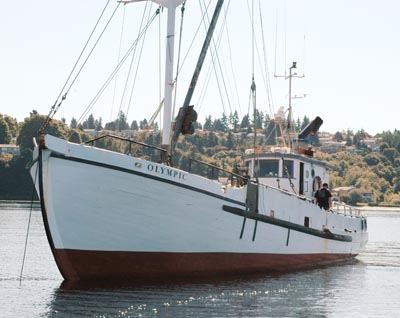
The FarmBoat program was started with the idea of saving an historic fishing boat built on the shores of Ballard in 1911. The Halibut Schooner “Olympic” is the oldest remaining commercial fishing vessel of her type built in Seattle. The dream of putting a piece of history back to work in providing an alternative food supply line from local farms into Seattle has come to an end over a financial dispute with City parking enforcement authorities that left the organization without funding.
The historic North Pacific halibut and cod fishery is significant because of its long standing tradition of environmental stewardship. There is much to be learned from the lessons of the past. The Olympic was originally built to cary small two-man fishing dories up to the Bering Sea in Alaska. In the early part of the century, halibut and cod could only be legally caught from non-powered vessels.
Built of heavy steam bent oak frames and planked with 2-1/2″ thick Alaskan Yellow Cedar, she is the last of the traditional Scandinavian designed vessels in Seattle. The Olympic is also the only vessel of that time period remaining in its original configuration.
The vessel was being used to develop routes between Puget Sound ports allowing local farms to reach consumers without having to drive trucks into the city. With the closure of the Floating Market at Lake Union Park, the newly established weekly run between Brownsville and Seattle for the Olympic had to be discontinued. The Olympic made her first deliveries of organic produce in June from Abundantly Green Farms in Kitsap County. Marilyn Holt , the fifth generation owner of the farm recalled when her great grandfather transported the farm’s crops by rowboat to the Seattle waterfront in the late 1800’s.
The folks behind FarmBoat had planned to fully restore the Olympic to her early 1900’s sailing configuration. The agri-maritime heritage project had put the historic boat back to work in a way that could have sustained it for future generations without costing tax payers. Preserving historic ships is among the most difficult and expensive propositions for maritime heritage organizations. Millions of tax payer dollars are spent each year in coastal states to fund heritage programs through grants. The FarmBoat program was designed to not only preserve historic vessels like the Olympic, but to provide a way for the public to actually experience their use.
Plans had to be scrapped this week due to unresolved issues with the City of Seattle over erroneous charges stemming from a farm merchant’s ten-year-old parking citation debt which left the newly formed non-profit organization financially paralyzed. The Olympic was an integral part of the FarmBoat Floating Market program managed by the Urban Public Waterfront Association (UPWA.org). The non-profit organization was founded to connect people to the sea in meaningful ways.
Many Seattle residents are mystified as to why Seattle bureaucrats are using the city’s “war on cars” to stop the use of the waterways for food transport into the city. Along with aiming to reduce trucks on Seattle roads, the FarmBoat program was meeting several other city initiatives including: Improving access to a wider range of healthy local foods, preserving maritime heritage, and helping to activate the city’s newly developed South Lake Union Park.
Since the UPWA fund raising campaign and Floating Market operation was disrupted by Seattle bureaucratic overreach, the owners of the Olympic are seeking to sell the boat at a substantial loss as quickly as possible to cover moorage charges at the Port of Seattle. Idle vessels do nothing but cost money that the organization is now blocked from getting until legal issues are resolved.
